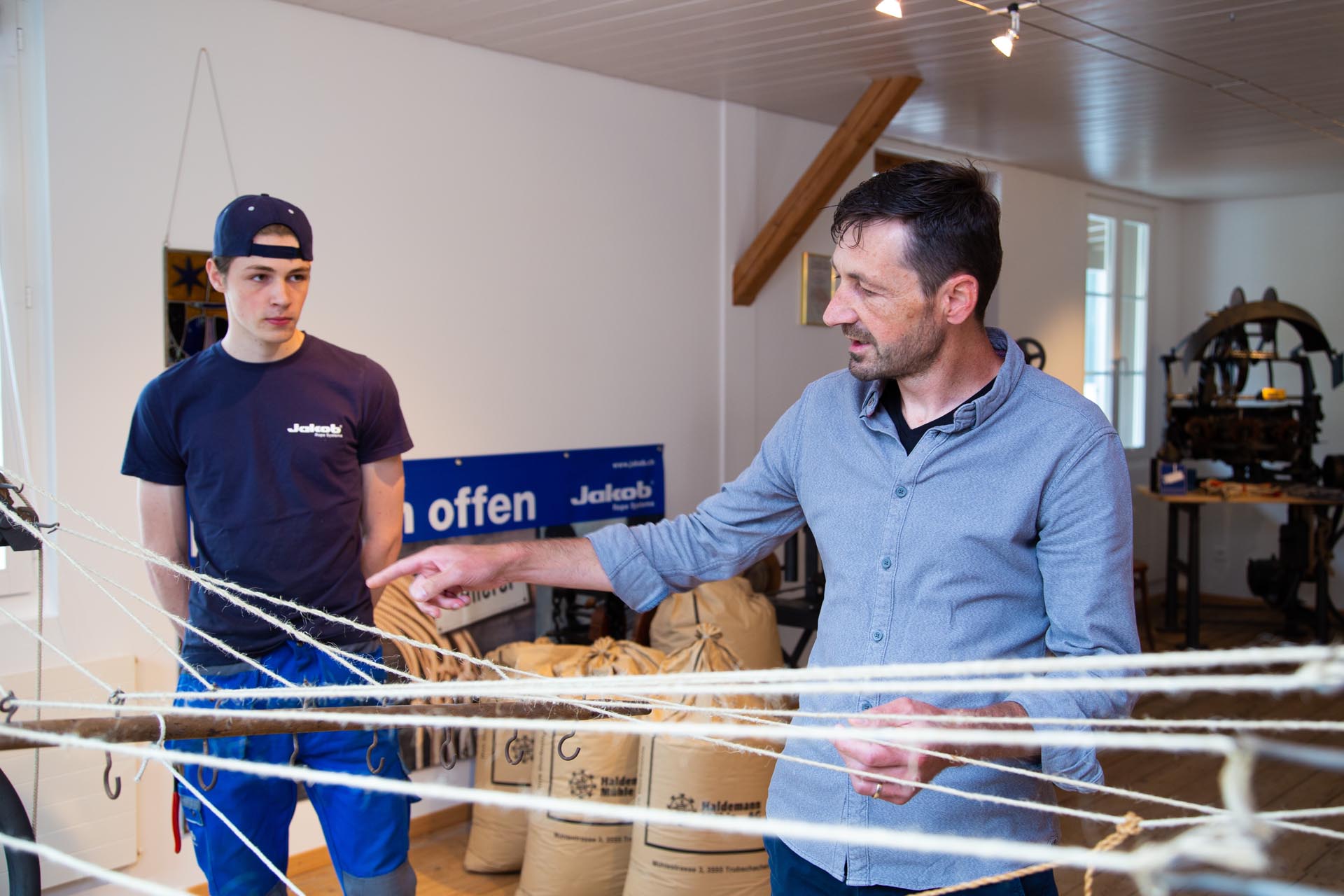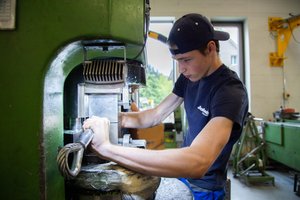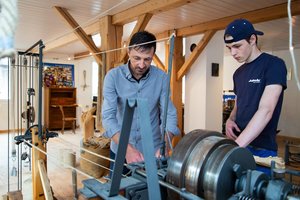
A traditional profession with a future
Once rope maker, today textile technologist
Why an apprenticeship as a rope maker at Jakob Rope Systems is still a good decision today. A former and a current apprentice tell us.
Rope maker: what sounds like a traditional craft and a dying profession is in fact a versatile profession with future prospects. Jakob therefore regularly offers apprenticeships leading to what is now officially known in Switzerland as “Textile technologist and expert in hoisting and lifting”.
Why is training as a rope maker still viable today? We asked a former apprentice and a current apprentice why they chose this profession. Beat Kobel did his apprenticeship as a rope maker at Jakob AG from 1994 to 1997 and now works as a technical salesman and project manager. His son Joshua has been training as a textile technologist since 2019. In the museum of Jakob AG father and son talk about the differences between yesterday and today.

Once rope maker, today international project manager
Beat Kobel did his apprenticeship from 1994 to 1997 at Jakob AG, at that time still officially as a rope maker. Beat remembers that at that time the apprenticeship was still very traditional: the final examination consisted of making a piece of hemp rope on hand-operated machines.
However, Beat was more interested in stainless steel ropes, with which the Jakob company was stirring up the architectural industry at the time. After a few years he moved to the sales office, where he advised customers on their projects. With Jakob's growing worldwide success, his job also became more international.
With not much more than a two-week English course, as he laughingly explains, and a lot of technical experience, Beat soon worked on architectural projects all over the world. Today he plans complex projects such as large zoo enclosures in Dubai, green high-rise buildings or the coordination of production between Jakob Switzerland and Jakob Saigon.
The experiences of his rope apprenticeship and the time spent in wire rope production still help him today. This enables him to give architects and planners better information about the properties and special features of wire ropes in architecture.

The apprenticeship today
Since 2019 Joshua Kobel is been doing his apprenticeship as a textile technologist specialising in rope and hoisting technology at Jakob Rope Systems. The fact that his father already works for Jakob was not the decisive reason for this. Actually, Joshua was initially interested in an apprenticeship as a polymechanic. After a trial apprenticeship with Jakob, however, he stayed with producing ropes. For his apprenticeship, he puts up with the regular trips to the Swiss Textile College in Zurich, where the theoretical instruction takes place.
Joshua appreciates the variety of the apprenticeship with Jakob. Wire ropes are produced and processed on large machines in the factory. Various metals are welded, pressed, cut and milled here. In the fibre rope department, on the other hand, the focus is on fine craftsmanship with different materials, which requires a great deal of sensitivity. Everywhere, theoretical and mathematical understanding is also needed to calculate rope constructions and rope lengths.
To produce a piece of rope that can carry several tons from individual thin wires: for Joshua, this is the most fascinating part of the rope craft.

An apprenticeship with a future
But does it make any sense at all to start such training when there are only a few jobs for ropemakers in Switzerland?
Beat is sure that Seiler is also highly qualified for many other jobs. For him, the strength is the versatility of the profession, the combination of the use of large machines and fine craftsmanship. Wire ropes and accessories also have a huge range of applications, from architecture and industry to traditional fields of rope and lifting technology such as forestry. Accordingly, one learns how to handle many different materials and can later work in various fields, whether in construction, materials handling or logistics. And finally, he himself is a good example of how adaptably trained ropes are and can also work in the office.
That's why Joshua is not worried about learning a dying profession. He concentrates fully on his apprenticeship and is sure that the skills he learns with Jakob will continue to be in demand in the future.
About the apprenticeship as a rope maker at Jakob
Samuel Zürcher, himself a trained ropemaker, is responsible for our apprenticeship program.

